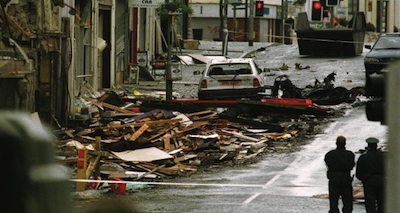
The British government has refused calls for a public cross-Border inquiry into the 1998 Omagh bombing.
The decision announced this morning preempted high-profile multi-party talks on the past by US envoy Richard Haass due to begin on Tuesday.
The announcement came in a statement by British Direct Ruler in Ireland, Theresa Villiers, and in a letter to members of the Omagh Support and Self Help Group.
In the letter, Ms Villiers said the British government had “after consultation and careful consideration” concluded that such an inquiry “is not in the public interest”.
She said there were not sufficient grounds to justify a further review or inquiry beyond the current Police Ombudsman’s investigation.
She added that there was support for an inquiry among a number of survivors and families of those killed in the bomb, but “others felt that a further inquiry would cause them considerable trauma”.
“All these views were weighed against other factors, including the series of previous inquiries into the Omagh bomb and the current investigation by the Office of the Police Ombudsman for Northern Ireland,” it said.
Last month just ahead of the August 15th fifteenth anniversary of the bombing the families said documents they presented to the Dublin and London governments over a year ago showed there was substantial evidence of foreknowledge state security forces of an attack on Omagh. Those documents came on top of evidence that a British Army communications team had been closely monitoring the mobile phones of the breakaway ‘Real IRA’ unit responsible for transporting the bomb, and had even hidden a tracking device inside the car being used.
But on the day, the attack proceeded without any intervention. Two warning calls failed to clear the town centre area, and the bomb exploded, killing 29 people and two unborn twins.
It was the most devastating loss of life since the Dublin and Monaghan bombings in 1974. The two attacks are often compared as possible British attempts to discourage support for the Provisional IRA and Real IRA, respectively.
The families said last month that if necessary they were prepared to go to the courts to try to compel the British and Irish governments to hold and inquiry.
Michael Gallagher, whose son Aiden was among the victims, condemned today’s decision, describing the reasons given by Ms Villiers for ruling out a public inquiry as “trivial”.
The families would be seeking recourse, he said. “Should we be denied truth and justice because other people don’t want it?”
He said he was “disappointed but not surprised” by the decision. “The reality is that Aiden need not have died.”
Referring to British condemnation of the Syrian government, he said: “I think it’s important to note that this is a government who are actually holding other governments to account over human rights abuses.
“Both the British and Irish governments failed to protect the human rights of those people.”
He added: “We gave both governments a document over a year ago that shows that both the British and Irish government could have done something to prevent the Omagh bomb.
“We have the result now - it’s not the result we wanted but at least we can move forward. We can go to the courts and that’s exactly what we will do.”
![[Irish Republican News]](https://republican-news.org/graphics/title_gifs/rn.gif)
![[Irish Republican News]](https://republican-news.org/graphics/title_gifs/harp.gif)

